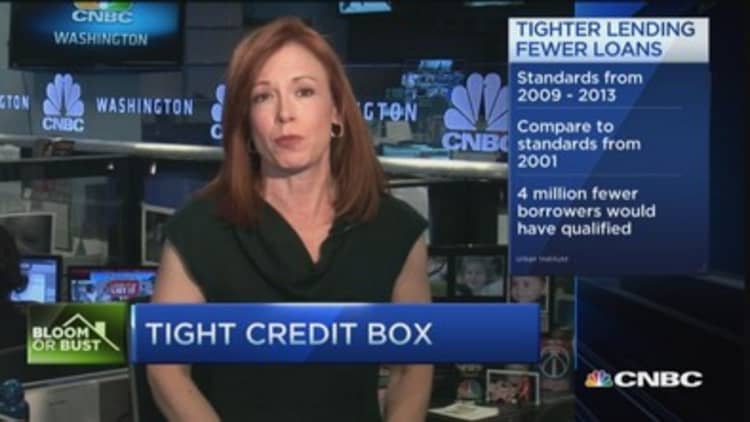
Not only is it harder to get a home loan today than it was during the height of the housing boom when lending standards went out the window, but it is also harder to get a loan today than it was before the boom, when mortgage underwriting was relatively conservative.
That is, according to a new report from the Urban Institute. How much harder? Researchers there claim that 4 million more loans would have been made between 2009 and 2013 if lenders had used the same standards as were used in 2001.
"The borrower's FICO score has become much more important in terms of who can qualify," said Taz George, a research associate with the Urban Institute. FICO measures a borrower's creditworthiness.
The report looks specifically at FICO scores (borrowers' credit ratings from a low of 300 to a high of 850, as gauged by Fair Isaac Corp. and commonly used by lenders).
Less than 40 percent of borrowers in 2013, using their loans to purchase a home, not refinance, had FICO scores below 720. In 2001, more than half did.
"When you look at more moderate credit score borrowers, those with a FICO of between 660 and 720, that's a score that in a year like 2001 we would consider eligible for a purchase mortgage, but today we see a 37 percent decline in the number of loans in that category," said George.
As for why the credit box remains so tight, the report points to lenders adding to credit standards because they are so worried they might be forced to pay back any loans that default. This so-called repurchase risk has been at the heart of credit tightening, since banks were forced to pay back billions of dollars in bad loans during the foreclosure crisis. Banks are also worried about litigation and the high cost of servicing troubled loans.
Read MorePriced out: New housing froth discourages buyers
The government, however, is trying to ease the credit crunch. Federal regulators for mortgage giants Fannie Mae and Freddie Mac have sought to clarify repurchase risk, while the FHA, the federal insurer of home loans, recently lowered mortgage insurance premiums. There are low down payment options.
"When it comes to mortgage credit availability, we believe the government has turned the corner and is now trying to encourage the expansion of credit rather than the contraction of mortgage availability," noted Jaret Seiberg, a managing director of Guggenheim Partners.
The steps, however, are small, but Seiberg points to regulators reducing costs for lenders as well as Secretary of Housing and Urban Development Julian Castro looking at new credit scoring models for FHA borrowers. FICO is also working on a new scoring model that could widen the credit box.
The problem though, argue some, is not tight credit but a still lagging economy.
Read MoreCrowdfunding house flippers: Risks and rewards
"What the researchers are not really looking at is that although credit looks like it's tighter than it's ever been, the fact of the matter is that income is lower than it's been in a long time," said Anthony Sanders, a professor of finance at George Mason University who claims credit is no tighter than it was in 2001. "Therefore there are a lot fewer households that can even qualify for a loan, so they're not even applying."
"We found evidence that many low credit borrowers have been deterred from even applying for a loan in the first place," George conceded,
It seems that a bigger factor in today's housing market than a FICO score is debt. The ratio of debt to income is closely watched by lenders today, as it was 15 years ago. It hasn't changed, but potential homebuyers today are facing higher levels of debt, especially first-time homebuyers. Younger Americans have substantially more student loan debt than they did decades ago.
Correction: This story has been updated to reflect the correct spelling for Taz George's name.


